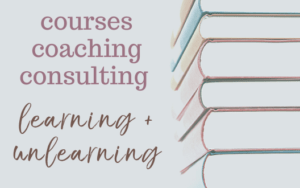I really struggle with July 4th. It’s a holiday that presumes to celebrate “freedom,” but freedom for whom? By what means? Under what circumstances?
It’s a holiday that celebrates myths like meritocracy and “the American Dream,” while keeping hidden systemic racism and other ongoing oppression.
It’s a holiday that normalizes narratives and displays of patriotism, which underlie white nationalism and the logics of “we” versus “them.” The “we” must be “better than” or “the best,” even when assertions that the United States is “the best country in the world” are wrong and do harm. Still, such assertions persist, especially around this holiday.
This year, the 4th of July left me feeling a physical pain (tightening and nausea) in my stomach. Pain at the many falsehoods. Pain at presumptions that this holiday is celebratory. Pain at attempting to go-about-the-day-as-usual when there’s no avoiding the systemic racism underlying all the red-white-and-blue attire, explosions of firecrackers both day and night, closure of public places in commemoration, and other patriotic displays.
So, I allowed myself to feel the pain, to grieve, and to seek sources for reframing this holiday and my experience of it.
I found initial relief through truth-telling—with deep appreciation to the blog “What’s the Meaning of the 4th of July to Marginalized People?” and the video “No Country for Me.”
I found inspiration through seeing friends reframe “independence day” as “interdependence day,” shifting the focus from colonialism and individualism toward a relational worldview.
I found a vision of a what Native Independence Day might look like, a vision of righting wrongs, redressing harm, and enacting equity and justice. Such a vision involves making visible the histories of genocide, human rights abuses, slavery, and oppression in the United States. It also involves acting with response-ability (as in the ability to respond)—moving from truth-telling and remembering to repairing and healing. It involves acting on what the truth compels.
If we in the United States want an annual celebration of freedom, then I’d ask that we wrestle with hard questions about whose freedom matters and why. How freedom can be achieved for all. What response-abilities are needed for collective, shared freedom.
Truly, liberation involves knowledge of the past, reckoning with the good and bad, and willingness to make right. It involves seeing one’s “freedom” in relation with others. How can one person be free when others still aren’t? Appreciating Nelson Mandela’s wisdom: “For to be free is not merely to cast off one’s chains, but to live in a way that respects and enhances the freedom of others.”

We have a looooooooooooooong way to go toward freedom. A long, long way, which is why I can’t celebrate the 4th of July. It’s not a celebratory holiday, though perhaps it could be a day for truth-telling and re-committing to justice. A day for valuing interdependence and everyday practices on the long haul toward justice.
I’m appreciative that this year my body reminded me through stomach pains that I can’t go about the day (or any day) as though it’s business as usual. For the usual is unjust. May I choose to tread another path, a path toward justice.
—
This post is written by Beth Godbee, Ph.D. for Heart-Head-Hands.com. For more posts like this one, you might try “Toward Public Outcry: Why I’ll Keep Repeating #AbolishIce and #CloseTheCamps” and “Speaking Up by Speaking Aloud Embodied Responses.”
To invest in ongoing truth-telling and deep-diving into conditioned ways of living, being, and intervening in the world, you might also consider the self-paced e-course, “40 Questions for 40 Walks: Toward Everyday Living for Justice.”
If you appreciate this site, if you connect with the storytelling, or if you use any of the recipes or resources, consider making a one-time or sustaining donation. Please also consider subscribing to posts and liking this blog on FB. Thanks!



Leave a Reply